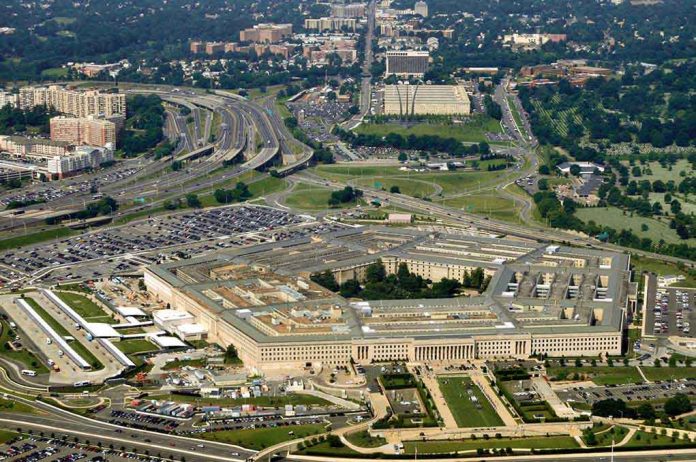
In a historic military leadership change, President Trump appoints Vice Admiral Brad Cooper to head U.S. Central Command, marking the first time a Navy admiral will lead this critical command since its founding in 1983.
Key Takeaways
- Vice Adm. Charles “Brad” Cooper II will become the first Navy admiral to lead CENTCOM in its 40+ year history
- Cooper played a pivotal role in operations against Houthi militants in Yemen, overseeing 100 strikes targeting their missile and drone capabilities
- Cooper has pioneered the use of AI, armed drones, and unmanned vessels in military operations
- Air Force Lt. Gen. Dagvin Anderson has been nominated to lead U.S. Africa Command, becoming the first Air Force officer in that role
- These appointments align with President Trump’s strategy to restore stability in the Middle East and promote global peace
Historic Appointment for CENTCOM Leadership
President Trump has made a groundbreaking selection in nominating Vice Admiral Charles “Brad” Cooper II to head the U.S. Central Command (CENTCOM), which oversees American military operations across the Middle East and Central Asia. Cooper, currently serving as CENTCOM’s deputy commander, will make history as the first Navy admiral to lead the command since its establishment in 1983. The Pentagon announced this significant appointment on Wednesday, marking a new chapter in American military leadership in one of the world’s most volatile regions. Cooper brings extensive experience as a surface warfare officer with numerous command roles throughout his distinguished career.
” Nominated Vice Adm. Charles Cooper to become the next chief of U.S. Central Command, according to a Pentagon notice,” Said President Trump.
Cooper’s Military Innovation and Combat Experience
Vice Admiral Cooper has established himself as a military innovator through his leadership in the U.S. 5th Fleet and Naval Forces Central Command. His tactical expertise became particularly evident during the ongoing conflict with Houthi militants in Yemen, where he directed 100 precision strikes against their missile and drone capabilities. Cooper has distinguished himself by championing the integration of cutting-edge technologies into military operations, including artificial intelligence, armed drones, and uncrewed vessels. These innovations have transformed American military capabilities in the region, providing enhanced surveillance and strike capabilities while reducing risk to personnel.
“”Brad” Cooper II was nominated to lead CENTCOM, which oversees U.S. forces and operations across the Middle East and central Asia, according to a Pentagon statement,” Said Vice Adm. Charles.
Cooper also demonstrated his humanitarian leadership capabilities through his oversight of the construction of a pier off Gaza, providing a crucial aid delivery mechanism in the conflict zone. If confirmed by the Senate, Cooper will receive his fourth star and replace General Michael “Erik” Kurilla, who is expected to retire after successfully defending Israel against Iranian attacks during his tenure. The nomination reflects President Trump’s strategic focus on ensuring capable leadership in this critical region as challenges with Iran and ongoing conflicts continue to demand decisive American military presence.
New Leadership for Africa Command
In a parallel appointment that further reshapes America’s military leadership across global hot spots, President Trump has nominated Air Force Lt. Gen. Dagvin Anderson to lead U.S. Africa Command (AFRICOM). This appointment also breaks new ground, as Anderson would become the first Air Force officer to head AFRICOM since its creation. Anderson currently serves as the director of Joint Force Development (J-7) and brings extensive experience commanding special operations units. His background includes flying KC-135 Stratotanker jets, providing essential aerial refueling capabilities for military operations worldwide.
“quickly restore stability in the Middle East,” Said President Donald Trump.
Trump’s Strategy for Regional Stability
These appointments reflect President Trump’s broader strategy to “return the world to peace” through strong military leadership in critical regions. The Middle East remains a particular focus for the Trump administration, with ongoing efforts to broker a ceasefire in Gaza and address the complex situation with Iran. President Trump has expressed optimism about the possibility of finding common ground with Iran, recognizing that fundamentally, as he put it, “They don’t want to be blown up.” This pragmatic approach, backed by military strength and capable leadership, underpins the administration’s foreign policy approach.
Additionally, the Pentagon has nominated Vice Adm. Frank Bradley to head U.S. Special Operations Command (SOCOM). Bradley currently commands Joint Special Operations Command and will join Cooper and Anderson in requiring Senate confirmation for their appointments. These strategic military leadership changes demonstrate President Trump’s commitment to placing experienced, innovative commanders in key positions as America navigates complex global challenges from the Middle East to Africa and beyond.



